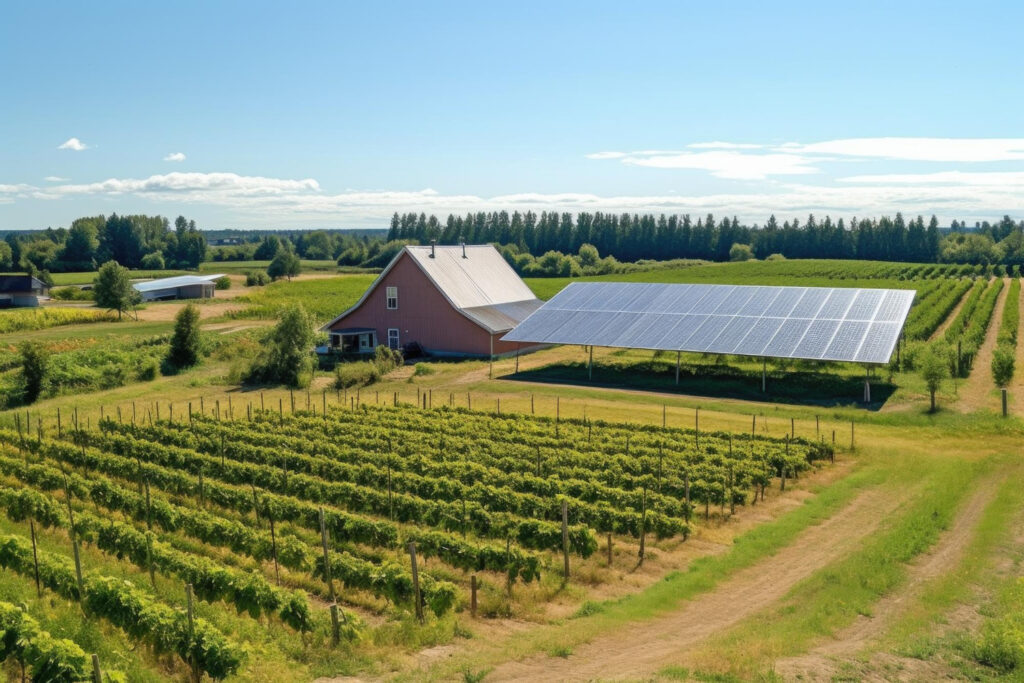
Introducing renewable energy on the farm can bring a plethora of advantages to farmers and agricultural workers. From energy independence to cost savings, the move can play a large part in ensuring a successful future for sustainable agriculture. Green farming practices have been growing in popularity over the past few years as more and more farmers are waking up to the long-term cost benefits and reduction in carbon footprints of switching over from fossil fuels to renewable energy sources.
Just as busy farmers are very used to multi-tasking, so farmhouse solar systems can also be put to work in several areas at once. Every penny counts when running a farm, especially in these financially challenging times. It is vital that money is spent wisely and with an eye to long-term financial gain. Here are some ways in which solar panels can represent an excellent return on investment for farms across the board.
Outbuildings, crop barns and livestock sheds
One of the highest outgoings for dairy, poultry and other farms producing livestock is electricity. Keeping cattle sheds, lambing barns and milking facilities lit, heated and supplied with water costs a lot of money. Yet it is vital to preserve the wellbeing of the animals and birds inside. Switching to solar power can save money and reduce reliance on fossil fuels for this important aspect of livestock farming.
Similarly, using solar energy to light grain stores and power security systems, CCTV etc. can save money while protecting valuable crops at the same time. Freezing fruit and vegetables to prolong their useful life is another example of how renewable energy can help crop farmers operate more sustainably.
Farming Equipment, Vehicles and Storage
When considering solar solutions for farms, equipment, vehicles and storage are crucial aspects to get right. Electric vehicles are now mainstream and can offer highly effective alternatives to petrol or diesel-powered cars, trucks, vans, quad bikes and tractors. Other benefits to changing to electric vehicles, besides cutting down on fossil fuel use, include being able to charge them on the farm so that they can be ready to drive whenever they are needed.
Likewise, using renewable energy to power agricultural equipment is clean, easy and efficient. There is less need to store flammable fuels on site, which is safer for everyone, and takes up less storage space. If farmers need to store surplus electricity generated by solar panels, they can do so using specialist solar batteries that can be kept somewhere accessible for when extra power is required.
Leasing Farmland for Solar
This is a great way to put any unused land or flat surfaces to good use. Installing a solar system on a barn or outhouse building, or on spare land, gives farmers the chance to profit from the sun’s energy twice. First of all, they can install solar panels for their own use – and then lease any extra space or land for other individuals or organisations to place solar panels and harness their own renewable energy.
Farmland is often excellent for solar energy generation due to it being flat, well exposed to the sun and often located away from built-up areas. Rural communities can also benefit from additional solar energy being produced on unused farmland and made available to others living in the vicinity.
Solar Panel Installation and Maintenance
Installing solar panels on farms is a straightforward process when carried out by professional company for optimum safety and after-sales support. Farmers can explore different options around type of panels, size of installation and potential; locations for the system. Battery storage options can also be included to maximise the return on investment for farms keen to make the switch to 24/7 renewable energy.
In addition, cleaning solar panels on farms is simple to do with the right equipment. Use a soft brush to clear leaves and other debris, with a damp cloth to gently wipe away stubborn dirt or dust. Often, rain can wash away much of the surface dirt, leaving the panels sparkling and ready to continue generating electricity from the sun. Finally, a regular servicing arrangement will keep the system operating properly all year round, removing work from busy farmers and keeping the power flowing across the farm.

